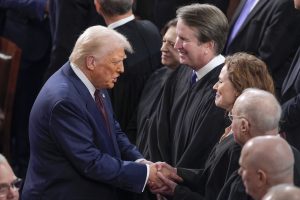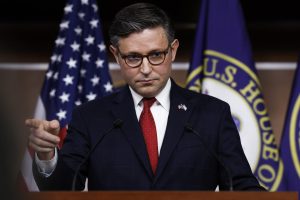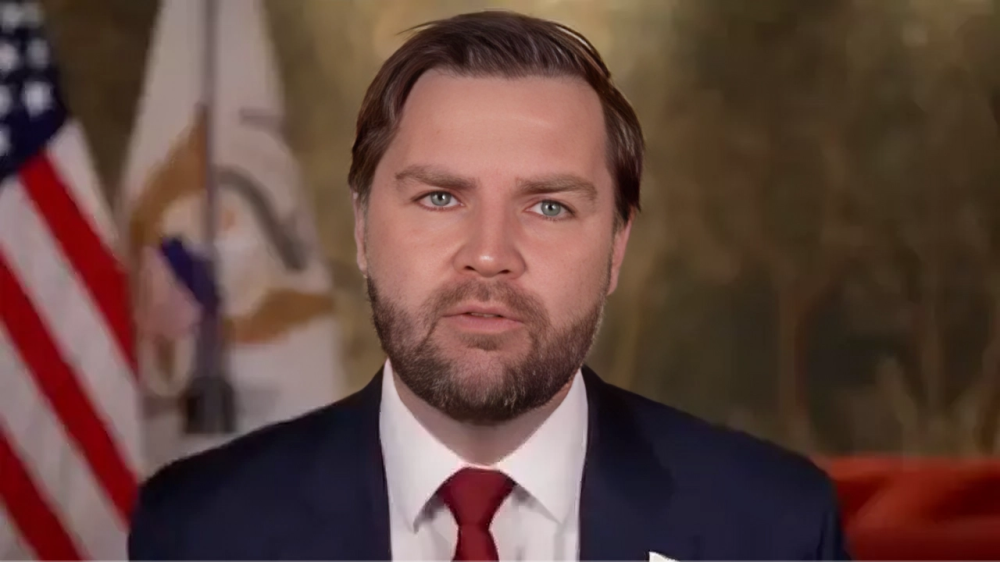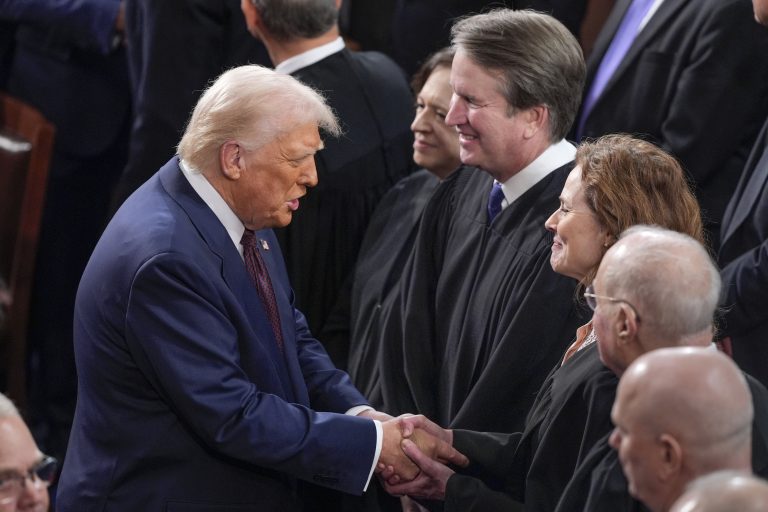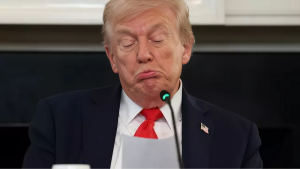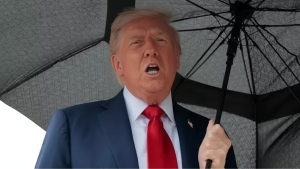It was the kind of live-TV meltdown that producers dread — and political strategists quietly fear. Vice President JD Vance was abruptly cut off mid-sentence during an interview on ABC’s This Week after a heated exchange with host George Stephanopoulos spiraled into an on-air confrontation about the show’s credibility, ratings, and the still-simmering Tom Homan bribery scandal.
The moment unfolded Sunday morning (October 12), and clips of the encounter quickly spread online. What began as a pointed question about alleged corruption inside the administration ended with the vice president railing against the media establishment, accusing Stephanopoulos of bias, and questioning why “fewer and fewer people” are watching his show.
When the show abruptly cut to commercials — leaving Vance audibly protesting as his microphone faded — social media lit up with reactions ranging from disbelief to outright mockery.
The Question That Triggered the Clash
The exchange started when Stephanopoulos pressed Vance about an alleged $50,000 cash payment to Trump’s “border czar,” former ICE director Tom Homan.
The allegation stems from an FBI sting operation in which undercover agents reportedly recorded Homan accepting the payment in September 2024. According to multiple Justice Department sources, officials believed they had sufficient evidence to pursue conspiracy and bribery charges — but the investigation was quietly shut down earlier this year.
The White House has denied any wrongdoing, and Homan has remained silent since the probe was closed.
Stephanopoulos asked directly:
“Did he accept the $50,000 that was caught on the surveillance tape? Did he accept that money or not?”
Vance, visibly irritated, fired back:
“George, you’ve covered this story ad nauseam. Tom Homan did not take a bribe. It’s a ridiculous smear. The reason you’re going after him is because he’s enforcing the law.”
The vice president accused ABC of fixating on Homan because “he has the audacity to want to enforce immigration laws,” adding that journalists should instead investigate the death threats Homan has reportedly received.
A Clash of Agendas
The tone quickly shifted from testy to confrontational. When Stephanopoulos repeated the question — emphasizing that the alleged bribe was captured on an FBI audio recording — Vance appeared to challenge the entire premise.
“Accepting $50,000 for doing what, George? I’m not even sure I understand the question. Is it illegal to take a payment for doing services? The FBI has not prosecuted him.”
That statement drew immediate pushback online, with critics noting that Vance appeared to suggest a government official could accept “payment for services” outside official duties — an interpretation at odds with federal ethics law.
Stephanopoulos pressed again, maintaining that he hadn’t “insinuated anything,” only asked a straightforward question. But by that point, the vice president was visibly frustrated.
“This Is Why Fewer People Watch Your Show”
As the exchange grew more strained, Vance turned his ire toward the network itself.
“And here’s, George, why fewer and fewer people watch your show — and why you’re losing credibility,” Vance snapped. “Because you’re spending five minutes talking with the vice president of the United States about a story that I have read about, but I don’t even know the video you’re talking about.”
He accused the veteran anchor of chasing “some weird left-wing rabbit hole” and ignoring what he described as “real issues” — border security, rising crime, and economic instability.
At that point, Stephanopoulos abruptly ended the interview, thanking the vice president “for your time this morning” as the camera cut away to commercials. Vance’s voice could still be heard faintly protesting as the program faded to black.
Fallout and Reactions
Within minutes, clips of the exchange went viral across social media platforms. Conservatives applauded Vance’s pushback against what they view as media double standards, while critics accused him of evading legitimate questions and lashing out when cornered.
On X (formerly Twitter), journalist accounts and political operatives traded clips of the confrontation. “Vance meltdown on live TV — denies knowing about FBI tape, then attacks the show’s ratings,” one headline read. Another commentator wrote, “You know you’re losing the argument when you pivot to Nielsen numbers.”
A White House spokesperson later defended the vice president, saying that Vance “was right to push back against biased insinuations” and that the administration “stands firmly behind Tom Homan.”
Meanwhile, ABC issued a brief statement confirming that the segment “ended as scheduled” and that no technical errors occurred — a diplomatic way of saying the cut-off was deliberate.
The Homan Case: A Political Flashpoint
Tom Homan, a longtime Trump ally and immigration hardliner, was tapped as “border czar” early in the administration. Known for his fiery rhetoric and televised defense of tough enforcement tactics, he’s become a lightning rod in debates over border policy.
The FBI investigation reportedly began after agents received a tip about cash payments linked to immigration-related contracting opportunities. According to sources cited by multiple outlets, undercover agents arranged a meeting last fall in which Homan allegedly accepted $50,000 in cash at a Washington hotel.
The Justice Department has neither confirmed nor denied details of the case, but internal documents reportedly indicated “sufficient evidence for further review.”
When the investigation was abruptly closed earlier this year, critics inside the department claimed political pressure from the White House played a role — an allegation the administration flatly denies.
A Test of the VP’s Media Strategy
For Vance, the episode underscores a growing challenge: balancing fierce loyalty to Trump’s agenda with the expectations of a more conventional political role. His willingness to confront journalists — sometimes aggressively — has made him a favorite among populist conservatives but a frequent target for media critics.
Supporters argue that his combative style resonates with voters who distrust traditional media, seeing his defiance as a badge of authenticity. Detractors counter that his temper and defensiveness risk undermining his credibility on complex issues.
In this case, both narratives were on display. Vance stood firm in defending Homan and the administration, but his irritation and decision to attack the show’s ratings overshadowed his talking points.
The Broader Battle Over Media Trust
The confrontation reflects a deeper fracture between the political right and mainstream outlets. For years, conservatives have accused networks like ABC, NBC, and CNN of skewed coverage, while journalists argue that aggressive questioning is essential to accountability.
Vance’s exchange with Stephanopoulos captured that tension in real time: two public figures talking past each other, each convinced the other represents what’s wrong with the system.
In a follow-up segment, Stephanopoulos defended his line of questioning, saying, “It’s our job to ask uncomfortable questions. Viewers can decide whether the answers hold up.”
Conclusion
The interview may not have lasted long, but its fallout will. Vance’s decision to challenge both the premise of the FBI probe and the credibility of a major network will energize supporters and embolden critics.
Whether it was a moment of strength or a strategic misstep remains to be seen — but one thing’s certain: live TV rarely lies.
And this time, the cut to commercials said it all.

Sarah Mitchell is a bestselling novelist recognized for her insightful and emotionally resonant stories that explore the complexities of human relationships. Originally from Denver, Colorado, Sarah grew up in a family of teachers who nurtured her curiosity and love for storytelling. She studied psychology at Stanford University, where she became fascinated by the intricacies of human behavior—an interest that would later shape her writing career. Sarah’s novels are praised for their nuanced characters, intricate plots, and ability to capture the subtle tensions that define love, friendship, and family ties. Her breakthrough novel, The Spaces Between Us, became an instant bestseller, lauded for its honest portrayal of strained family relationships and the fragile bonds that hold people together. Since then, she has published several works that continue to captivate audiences around the world. Outside of her writing career, Sarah is passionate about mental health advocacy and often partners with organizations to promote awareness and support for those struggling with emotional well-being. Her personal life is quieter—she enjoys hiking in the Colorado mountains, practicing yoga, and spending time with close friends. With each new book, Sarah Mitchell cements her reputation as a writer who illuminates the beauty and struggles of human connection.

